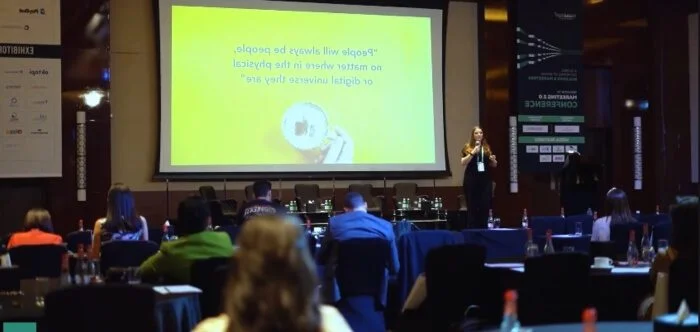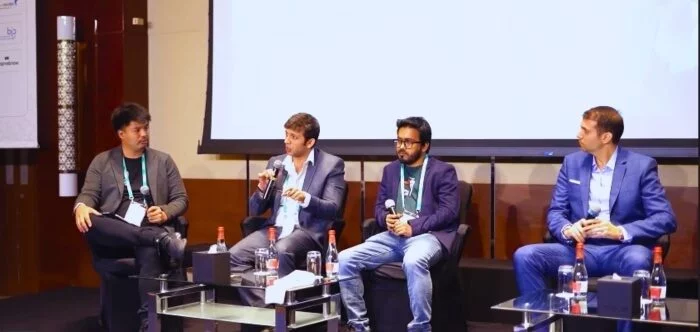Conferencing can often be a rewarding experience on both an intellectual and professional level. But a question frequently arises is, “Do you get paid for attending a conference?”
Yes, it is indeed possible to receive payment for your presence at these events. This could be in the form of honorariums, stipends, or even coverage of travel and accommodation expenses. Such opportunities provide a unique blend of learning and earning, making them highly sought after.
Are you curious to learn more about how you can benefit financially from attending conferences? Keep reading as we dive into the complexities of this topic, uncovering how you can turn your next conference attendance into a profitable venture.
A General Overview of Conferences
Conferences are pivotal gatherings where professionals and enthusiasts from various fields converge to share knowledge and insights. These events typically feature keynote speeches, workshops, and networking opportunities, promoting both learning and collaboration. They serve as platforms for the latest industry trends, research findings, and innovative ideas.

In these dynamic environments, attendees gain access to a wealth of information and expertise. Conferences are ideal for connecting with peers, mentors, and industry leaders, especially when attending conference with a top keynote speaker. The exchange of ideas at these events often sparks new collaborations and projects.
Moreover, conferences are not just for gaining new knowledge; they also offer a stage for presenting one’s work. Professionals and academics alike benefit from the feedback and engagement of their peers. This interaction is crucial for both personal and professional growth in any field.
Why Should You Attend a Conference?
Taking part in a conference is a valuable experience for professionals and students. It offers unique opportunities for networking, learning, and personal growth. Listed below are some detailed reasons to attend a conference:
Networking Opportunities
Networking is a fundamental reason to attend this conference. These events bring together like-minded individuals, offering a chance to connect, exchange ideas, and foster professional relationships. Engaging with peers and industry leaders can open doors to collaborations and new career opportunities.
Moreover, conferences provide a setting to meet mentors and influencers in your field. The connections made here can be invaluable for personal and professional development. Networking in such environments often leads to long-term relationships and collaborations.
Learning and Development
Conferences are rich in educational experiences. They provide access to the latest industry trends, research, and technologies, keeping you at the forefront of your field. This continuous learning is vital for personal and professional growth.
Attending workshops and seminars at these events can enhance your skill set and knowledge base. The diverse range of topics and expert speakers offer insights that are hard to find elsewhere. This exposure is essential for staying relevant and competitive in today’s fast-paced world.
Exposure to New Ideas and Perspectives
Exposure to new ideas is another significant benefit of attending conferences. They present diverse perspectives, challenging your thinking and encouraging innovation. This exposure is crucial for creative problem-solving and generating new ideas.
Listening to different viewpoints and approaches can broaden your understanding of your field. It encourages you to think outside the box and approach challenges innovatively. Such diversity in thought is a key driver of progress and creativity.
Presenting Your Work
Conferences provide a platform to present your work and gain feedback, which is a valuable opportunity for professionals and researchers to showcase their projects and studies. Receiving constructive criticism from peers and experts can refine your work and ideas.
Additionally, presenting papers at conferences also enhances your visibility and credibility in your field. It establishes you as a knowledgeable individual and can lead to further opportunities for collaboration and advancement. This recognition is vital for career growth.
Professional Recognition and Growth
Attending and participating in conferences can boost your professional profile. Active involvement in these events is often recognized and valued in professional circles. It demonstrates a commitment to your field and continuous learning.
Moreover, conferences can offer certification or continuing education credits, contributing to your professional qualifications. This recognition is essential for maintaining certifications and progressing in your career. It reflects a dedication to staying informed and skilled in your profession.
Inspiration and Rejuvenation
Finally, conferences can be a source of inspiration and rejuvenation. They provide a break from the routine, offering a fresh perspective and renewed motivation. This change of scenery can reinvigorate your passion for your work.
Being surrounded by passionate individuals can be incredibly motivating. It reminds you of the excitement and potential in your field, reigniting your enthusiasm. This inspiration is essential for maintaining passion and drive in your career.
The benefits of attending conferences are numerous, both personally and professionally. From networking to learning, presenting, and finding inspiration, these events are a cornerstone for growth and success in any field. Embracing the opportunities presented at conferences can significantly advance your career and personal aspirations.
Do You Get Paid for Attending a Conference?
Yes, in some cases, you can indeed get paid to attend conference. This unique opportunity varies depending on the type of conference, your role in it, and the policies of the organizing bodies. It’s a scenario that blends professional development with potential financial benefits.
Speaking Engagements
If you’re invited as a speaker, you may receive an honorarium or a stipend for your contribution. This payment recognizes your expertise and the value you bring to the event. Renowned experts and keynote speakers often attract these financial incentives.
Conference organizers may also cover travel and accommodation expenses for speakers. This is a form of indirect payment, reducing the financial burden on the speaker. It’s common in academic and professional conferences. Additionally, speaking at conferences can enhance your professional reputation, leading to more paid opportunities.
Sponsorships and Grants
Some professionals attend conferences under sponsorships or grants. Employers, educational institutions, or third-party organizations provide these funds. They often cover registration fees, travel, and accommodation costs.
Applying for conference grants requires meeting certain criteria set by the sponsoring body. These criteria include presenting research, representing an organization, or being in a specific field. Securing a sponsorship or grant can make attending a conference financially viable and profitable.
Volunteer Compensation
Volunteering at a conference can come with perks, such as free admission or small stipends. While not a direct payment, these benefits offer financial value. Volunteers gain access to the event without the typical costs involved.
In addition, volunteering at conferences can lead to networking opportunities and learning experiences. These intangible benefits can have long-term positive effects on your career and education. It’s a way to engage deeply with the conference content while mitigating expenses.
Employment Opportunities
Attending conferences can indirectly lead to paid opportunities. Networking with professionals in your field can open doors to new job offers or collaborative projects. These interactions can be more valuable than direct payment for attending.
Furthermore, showcasing your work or research at a conference can attract the attention of potential employers or investors. This exposure can lead to lucrative offers and professional advancements. Thus, the long-term financial benefits of attending conferences can be substantial.
While only sometimes directly paid, attending conferences can offer various forms of financial benefits and opportunities. Whether through speaking engagements, sponsorships, volunteering, or networking, the potential for monetary gain, directly or indirectly, is a significant aspect of conference participation. These opportunities underscore the multifaceted value of attending professional gatherings.
Who Gets Paid to Attend a Conference?
Attending conferences can sometimes come with the perk of getting paid, though this is a unique experience. Those who receive payment or compensation have specific roles or qualifications. Here, we’ll explore who these individuals are and why they might be compensated:
- Keynote Speakers: Renowned experts invited as keynote speakers are often paid an honorarium for their presentations. Their expertise and reputation bring significant value to the conference, warranting this financial recognition.
- Panelists and Workshop Leaders: Professionals leading workshops or participating in panels may receive payment for their contributions. Their role in facilitating discussions and imparting knowledge is essential to the conference’s success.
- Research Presenters: Academics presenting novel research might receive grants or stipends, especially if their work is of significant interest. Educational institutions or conference organizers can provide these funds to support scholarly work.
- Sponsored Attendees: Individuals sponsored by companies or organizations to attend conferences may have all expenses covered. It includes registration fees, travel, and accommodations, effectively making their attendance at no personal cost.
- Volunteers with Perks: Volunteers at conferences often receive benefits like free admission or access to exclusive sessions. While not direct payment, these perks offer financial value and enrich the conference experience.
While only some get paid to attend conferences, certain roles like keynote speakers, panelists, and sponsored attendees often do receive some form of compensation. This compensation can be direct payments, coverage of expenses, or access to exclusive opportunities, highlighting the diverse benefits of participating in these professional gatherings.
Tips for Attendees to Make the Most of Conference Experience
Taking part in a conference offers the opportunity to gain invaluable knowledge and network with like-minded individuals. It’s especially beneficial for those participating in a conference for the first time. Here are some practical tips to help attendees maximize their conference experience.
- Plan Your Schedule in Advance: Decide which sessions are a must-see, balancing your learning objectives. This ensures you don’t miss key presentations.
- Engage Actively: Ask questions during sessions to clarify doubts and deepen your understanding. Engaging makes the sessions more interactive and informative.
- Network Strategically: Identify attendees who share your interests and professional goals. This can lead to meaningful exchanges and potential collaborations.
- Take Notes Effectively: Capture key points and insights during talks to review later. This helps reinforce what you’ve learned and aids in post-conference reflection.
- Explore Exhibitions: Visit booths and displays to learn about new tools and technologies. This is a chance to see innovations that can impact your field.
- Join Social Events: Participate in dinners and meet-ups to forge new relationships. These less formal settings foster comfortable networking.
- Follow Up Promptly: Reach out to new contacts within a week of the conference. Timely follow-up keeps the connection alive and can lead to opportunities.
- Reflect and Act: Review your notes and determine actionable steps post-conference. Applying new knowledge quickly maximizes the return on your investment.
Final Words
In summarizing this rich discussion, it’s clear that the query “Do you get paid for attending a conference?” has a multifaceted answer. While direct payment is not a universal experience, specific roles like keynote speakers, panelists, and sponsored attendees often receive financial benefits or compensation.
These benefits, whether in honorariums, stipends, or covered expenses, enhance the appeal of conference participation. The indirect advantages of networking, exposure, and professional development opportunities cannot be overstated.
Potential attendees need to understand the various avenues through which they can benefit, financially or otherwise, from conference participation. This understanding ensures they can fully leverage the opportunities presented, leading to professional growth and potentially profitable ventures.







